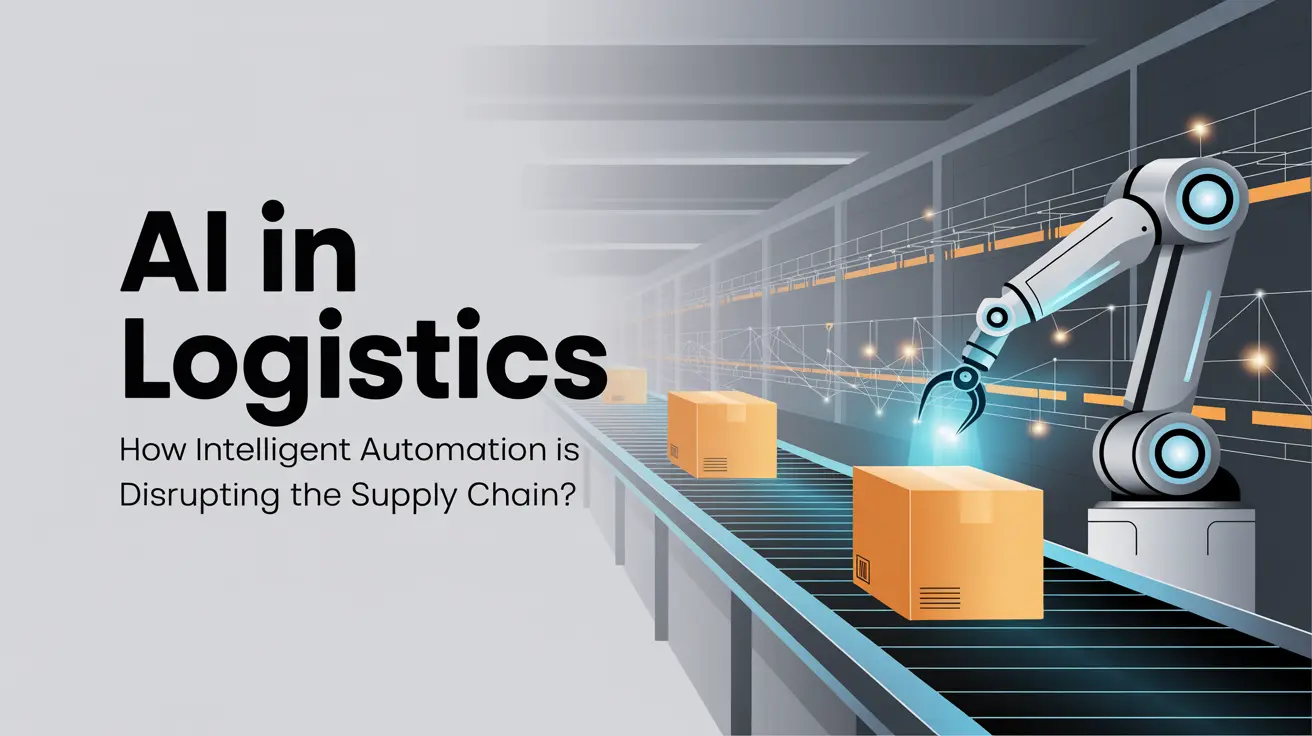Home / Blog / AI in Logistics: How Intelligent Automation Is Disrupting the Supply Chain?
Artificial Intelligence is transforming logistics from a cost center into a competitive advantage. In this blog, we explore how AI-powered automation, predictive analytics, and intelligent decision-making are reshaping supply chain operations. From reducing delays to optimizing routes and improving demand forecasting, businesses that adopt AI in logistics can unlock greater efficiency, scalability, and resilience.
28 Aug, 2025

1. Why Supply Chain Efficiency Matters More Than Ever?
In today’s fast-moving economy, the speed and accuracy of supply chains are crucial to business success. From global manufacturers to last-mile delivery services, customers expect on-time performance and full transparency.
But traditional logistics models are struggling to keep up. That’s where AI comes in.
73% of
logistics leaders say AI and automation are essential to remain competitive by
2025. (Source: Capgemini Research Institute)
Companies using AI in logistics report a 20–25% improvement in delivery
accuracy. (Source: McKinsey)
2. Predictive Demand and Inventory Planning
Forecasting demand used to rely on seasonal trends and historical sales. AI takes this to the next level by analyzing real-time market data, weather conditions, promotions, and global events to forecast demand with much greater precision.
Real-world
example:
Retail giant Walmart uses AI for dynamic inventory optimization across its
global supply chain. This predictive model helps ensure the right products are
in the right place at the right time reducing stockouts and excess inventory.
(Source: Walmart Global Tech)
3. Intelligent Route Optimization
AI-powered logistics platforms continuously assess road conditions, traffic, fuel costs, and weather to recommend the most efficient delivery routes. These tools also adapt in real time when disruptions occur.
Real-world
example:
UPS uses its ORION (On-Road Integrated Optimization and Navigation) system,
which uses AI to evaluate 250 million data points daily and optimize delivery
routes. It saves the company millions in fuel costs annually and reduces
emissions significantly. (Source: UPS Pressroom)
4. AI in Smart Warehousing and Fulfillment
Modern warehouses are evolving into intelligent ecosystems. AI supports automation in:
Real-world
example:
Amazon Robotics uses AI-driven bots that coordinate with warehouse workers to
speed up order fulfillment and reduce human error. Orders that once took hours
now ship in minutes. (Source: Amazon Science)
5. Real-Time Visibility and Risk Mitigation
AI systems monitor thousands of variables supplier delays, geopolitical issues, weather, and labor shortages to proactively alert logistics teams and adjust operations before disruptions cause real damage.
Stat:
AI-driven supply chains can identify and respond to risks 30% faster than
traditional systems. (Source: Gartner)
6. Automated Freight Matching and Pricing
AI is streamlining freight logistics by automating:
Real-world
example:
Convoy, a digital freight network, uses AI to match shipments with available
trucks instantly, optimize pricing, and eliminate manual negotiations boosting
efficiency for both carriers and shippers. (Source: Convoy)
7. Sustainability Through Smarter Decisions
Beyond speed and savings, AI is helping supply chains become more sustainable. Intelligent algorithms optimize fleet efficiency, minimize empty miles, and recommend lower-emission routes.
Stat:
AI can reduce logistics-related carbon emissions by up to 15% by optimizing
transportation and warehouse operations. (Source: World Economic Forum)
Conclusion: The Future of Logistics is AI-Powered
AI is not just another tech trend it’s fundamentally transforming the way supply chains operate. From predicting demand to optimizing every movement of goods, AI brings speed, intelligence, and resilience to a once-fragmented system.
For logistics providers, distributors, and retailers alike, embracing AI is no longer optional it’s the foundation of competitive advantage in a digital-first economy.
Ready to Automate Your Supply Chain?
AI is reshaping logistics are you ready to keep up? If your business is looking to optimize inventory, streamline deliveries, and gain real-time visibility across your supply chain, intelligent automation is the key.
At 10turtle, we build powerful AI-driven logistics systems tailored for efficiency, speed, and scalability. From predictive algorithms to automated workflows, we help logistics businesses thrive in the era of digital transformation.
Contact 10turtle for a free consultation and let’s turn your vision into reality.